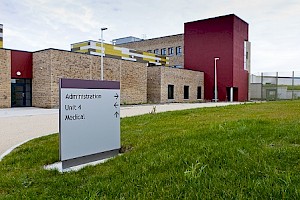Youth Justice
Ireland has a long history of poor responses to offending behaviour by children. A core strand to IPRT's work since its establishment in 1994 has been the promotion of a more effective youth justice system, with emphasis on non-custodial alternatives, diversion, early intervention and prevention strategies and programmes. Central to our work was ending the practice of detaining children in adult prisons, which was in breach of international human rights standards and a serious stain on Ireland's human rights record.
International human rights standards, and in particular the provisions of the UN Convention on the Rights of the Child, are clear that custody for children should only be used as a last resort and for the minimum required period of time. All efforts should be made to apply alternatives to detention to ensure that such a measure is only used in exceptional circumstances.
In Ireland, the Children Act 2001 recognizes the principle of detention as a last resort. The Act prohibits the imprisonment of children and the Criminal Justice Act 2006 makes provision for all children less than 18 years of age to be detained in Children Detention Schools. The detention school model is focused on a model of care, education, health and programmes that address offending, with improved outcomes for the young people, their communities and all of society. The Irish Youth Justice Service is responsible for the Children Detention Schools, within the Department of Children and Youth Affairs.
Following years of sustained advocacy by IPRT, along with many national and international bodies, in 2012 the detention of boys aged under 17 at St Patrick's Institution ended. In March 2017, a Ministerial Order ended the sentencing of children aged under 18 to adult prison in Ireland, and in April 2017, St. Patrick’s Institution was finally closed. Since September 2017 boys aged under 18 are no longer detained in the adult prison system.
IPRT continues to work towards progressive change in youth justice policies and practice, as well as engaging with wider policy and practice issues relating to youth justice, such as the provision of alternatives to detention, diversion and early intervention programmes.

RTÉ 'This Week': Imprisonment of boys in St. Patrick's Institution
15th January 2012
"Nobody deserves St Patrick's as it's currently configured" - RTÉ's 'This Week' focuses on the ongoing imprisonment of boys in St Patrick's Institution.
Juvenile detention centre plans shelved
4th January 2012
Plans to build the new detention centre for teenage boys at Oberstown, Lusk, Co Dublin have been shelved due to a lack of funding, according to Minister Shatter.
Oireachtas Seminar on St Patrick's Institution
15th November 2011
The seventh seminar for the All Party Oireachtas Penal Reform Group of TDs and Senators focused on the incarceration of children in St Patrick’s Institution.
Irish Youth Justice Service Annual Report 2010
25th October 2011
The third annual report of the Irish Youth Justice Service has been released and details the progress made in 2010 on the implementation of the National Youth Justice Strategy 2008-2010.
U.S: 'No Place for Kids: The Case for Reducing Juvenile Incarceration'
4th October 2011
A new report, published today, examines the United States' approach to juvenile incarceration, which has been proven to be a failed and flawed approach to reducing and combating youth crime.
(Northern Ireland) Publication of Review of Youth Justice System
27th September 2011
Justice Minister David Ford today published a report which highlights recommendations for change in the youth justice system, and wider recommendations for children in Northern Ireland.
US: 'Resolution, Reinvestment, and Realignment: Three Strategies for Changing Juvenile Justice'
21st September 2011
A new report from the Research and Evaluation Center at John Jay College of Criminal Justice reviews the most prominent juvenile correctional reform models from the past 40 years.
IPRT calls on Government to act on Human Rights Commissioner's Recommendations
15th September 2011
The Irish Penal Reform Trust has today called on Government to act on strong recommendations made by the Council of Europe Commissioner for Human Rights, Thomas Hammarberg, concerning children held in St. Patrick's Institution.
UK: 'Life Outside: Collective Identity, Collective Exclusion'
14th September 2011
The Howard League for Penal Reform has published a new report which focuses on life after young people leave custody and come under the supervision of youth offending teams.
2010 Annual Report of the Committee Appointed to Monitor the Effectiveness of the Diversion Programme.
13th September 2011
The Minister for Justice, Equality and Defence, Mr. Alan Shatter, T.D., today published the 2010 Annual Report of the Committee Appointed to Monitor the Effectiveness of the Diversion Programme, which highlighted that fewer children were diverted to the programme last year.




